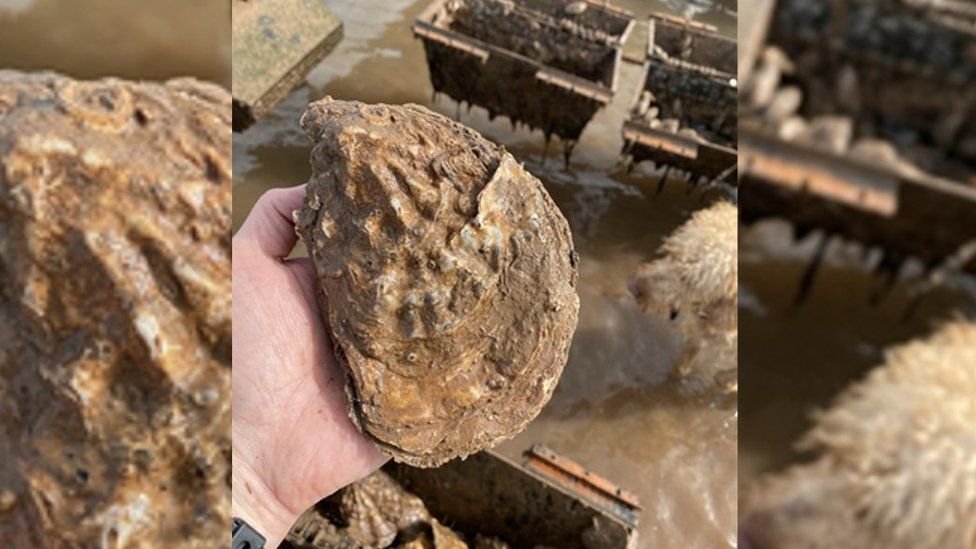Killer oyster virus on River Exe for first time
Image source, Martin Syvret
Image caption,The virus can only be passed between Pacific Oysters, the Fish Health Inspectorate said

A herpes virus which can be lethal to Pacific oysters has been confirmed in Devon's River Exe for the first time.
The government confirmed it had defined a "containment area" covering the river's tidal waters and coastal zone.
Samples were taken from the site after a shellfish farmer reported "unusual mortalities".
The Fish Health Inspectorate (FHI) said there was no risk to other marine life or humans.
Chris Evans, lead inspector at the FHI told the BBC they took samples from the site in August which tested positive for the oyster herpesvirus-1 microvariant among Pacific oysters.
The "containment area" means these oysters, which are labelled as an "invasive species" by some conservationists, cannot be moved to places where the disease has not been recorded.
"Farmers can still sell Pacific oysters for human consumption as they normally do because the risk of the disease transferring through that route is very minimal," Mr Evans said.
The virus is spread through the movement of oysters, shipping movements, or even people not cleaning their boots, he said, with no known link to contamination or dredging.
He added: "Oyster herpes virus microvariant is what we call a listed disease.
"So the government wants to place controls and stop the spread of it, because it has the potential to impact upon not only oysters, but also businesses operating in the coastal zone."
Image source, Martin Syvret
Image caption,Martin Syvret has plans for an oyster farm on the Exe
He said outbreaks can lead to "upwards of about 90% mortality", impacting farmers who "lose a significant amount of stock" and leading to economic damage.
"When I worked on an oyster farm myself it was horrible to see the amount of stock die," he added.
"There's no treatment for it."
Mr Evans said the first known occurrence of the virus was in Kent in 2009.
It then spread along the coastline to areas including Essex and Poole Harbour, and is also present in Jersey.
This was the first time the virus had been recorded in the Exe, although the Teign has been classed as a "containment area" since 2015, he confirmed.
Once an area is designated, it remains for as long as it is listed, and it is a "warm water disease", Mr Evans said.
Image source, Nigel Mortimer
Image caption,Pacific oysters are found across parts of Devon and Cornwall
His team monitors the coastline to try and keep it free from the virus, working closely with farmers on biosecurity measures, and raising public awareness of containment zones.
Martyn Syvret of Aquafish Solutions, is establishing a pilot oyster farm within the containment zone on the Exe.
He said: "This disease can create large scale mortalities and has an economic impact.
"Being a disease-free area means farms can only buy seed from certain hatcheries, whereas having the virus means they can buy more cheaply from French hatcheries."
He added: "The French industry is putting a lot of resource into developing new strains of Pacific oysters that are less susceptible to the virus."
'Disappointment'
David Jarrad, chief executive of the Shellfish Association of Great Britain, said: "I think it is sad.
"But it's not surprising as oyster herpes is endemic in other European countries."
He stressed the virus only affects Pacific oysters, adding: "Any oysters on the market are, of course perfectly safe to eat.
"It hasn't been found anywhere else over recent years, which we had hoped was a good thing, so this was a disappointment to see that is has now been found in the Exe," he added.
Follow BBC News South West on Twitter, Facebook and Instagram. Send your story ideas to [email protected].












!["One Step [Day] At A Time" - The Trek](/_largethumb/uploads/news/110/11028/0/11028053-one-step-day-at-a-time-the-trek.jpg.webp)
!["One Step [Day] At A Time" - The Trek](/_newsthumb/uploads/news/110/11028/0/11028053-one-step-day-at-a-time-the-trek.jpg.webp)



















